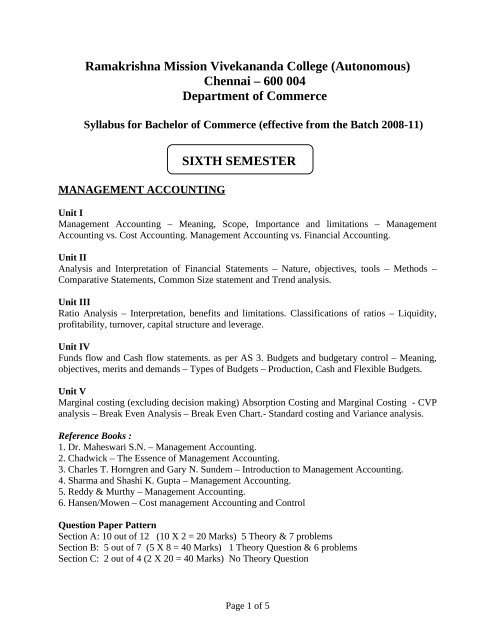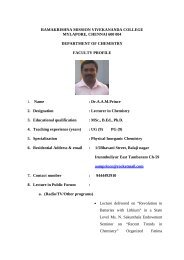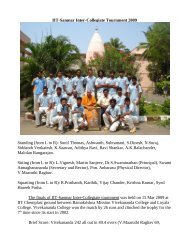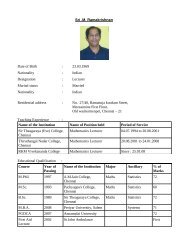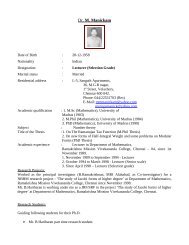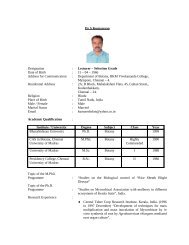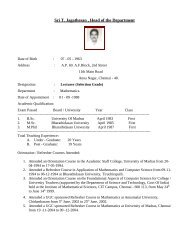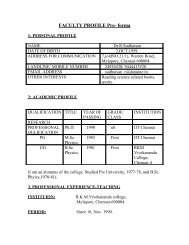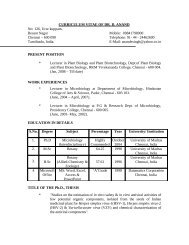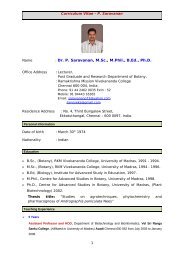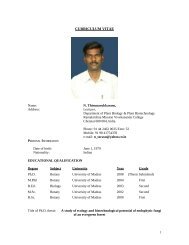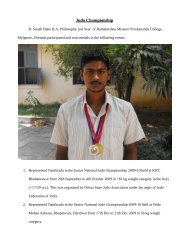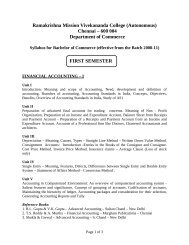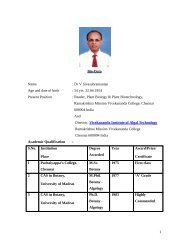Ramakrishna Mission Vivekananda College (Autonomous) Chennai ...
Ramakrishna Mission Vivekananda College (Autonomous) Chennai ...
Ramakrishna Mission Vivekananda College (Autonomous) Chennai ...
- No tags were found...
Create successful ePaper yourself
Turn your PDF publications into a flip-book with our unique Google optimized e-Paper software.
<strong>Ramakrishna</strong> <strong>Mission</strong> <strong>Vivekananda</strong> <strong>College</strong> (<strong>Autonomous</strong>)<strong>Chennai</strong> – 600 004Department of CommerceSyllabus for Bachelor of Commerce (effective from the Batch 2008-11)MANAGEMENT ACCOUNTINGSIXTH SEMESTERUnit IManagement Accounting – Meaning, Scope, Importance and limitations – ManagementAccounting vs. Cost Accounting. Management Accounting vs. Financial Accounting.Unit IIAnalysis and Interpretation of Financial Statements – Nature, objectives, tools – Methods –Comparative Statements, Common Size statement and Trend analysis.Unit IIIRatio Analysis – Interpretation, benefits and limitations. Classifications of ratios – Liquidity,profitability, turnover, capital structure and leverage.Unit IVFunds flow and Cash flow statements. as per AS 3. Budgets and budgetary control – Meaning,objectives, merits and demands – Types of Budgets – Production, Cash and Flexible Budgets.Unit VMarginal costing (excluding decision making) Absorption Costing and Marginal Costing - CVPanalysis – Break Even Analysis – Break Even Chart.- Standard costing and Variance analysis.Reference Books :1. Dr. Maheswari S.N. – Management Accounting.2. Chadwick – The Essence of Management Accounting.3. Charles T. Horngren and Gary N. Sundem – Introduction to Management Accounting.4. Sharma and Shashi K. Gupta – Management Accounting.5. Reddy & Murthy – Management Accounting.6. Hansen/Mowen – Cost management Accounting and ControlQuestion Paper PatternSection A: 10 out of 12 (10 X 2 = 20 Marks) 5 Theory & 7 problemsSection B: 5 out of 7 (5 X 8 = 40 Marks) 1 Theory Question & 6 problemsSection C: 2 out of 4 (2 X 20 = 40 Marks) No Theory QuestionPage 1 of 5
FINANCIAL MANAGEMENT(Elective)( Problems : Theory = 50 : 50 )Unit IFinancial Management: Definition – Objectives - Functions of a finance manager -FinancialPlanning -Time value of money - Measuring Return and RiskUnit IICapital Structure: Sources of long term finance - Factors influencing capital structure -Importance of Capital Structure – EBIT / EPS analysis - Indifference Point - Financial,Operating and Combined leverage - Capital Structure Theories (except MM theory)Unit IIICost of Capital: Measurement and Significance – Cost of Debt – Cost of Preference Capital –Cost of Equity – Cost of retained earnings – Weighted average cost of Capital.Unit IVCapital Budgeting Decisions: Nature of Investment Decisions – Investment Evaluation Criteria –Payback Period – Accounting rate of return – Discounted Payback period - Net Present Value –Internal Rate of Return – Profitability Index.Unit VWorking Capital Management: Sources of short term finance – Concept of Operating / workingCapital Cycle – Determinants of Working Capital – Estimation of Working Capital. CashManagement: Liquidity Needs – Cash Management Techniques (Lock Box System,Concentration Banking, Collection centers and Factoring). Receivables Management: Ageingschedule – Credit policy alternatives (credit period, credit limit, discounts, collection efforts andcredit standards)Reference :1. Financial Management – S.N.Maheswari2. Financial Management - Prasanna Chandra3. Financial Management - I.M.Pandey4. Financial Management - Khan and JainQuestion Paper PatternSection A: 10 out of 12 (10 X 2 = 20 Marks) 6 Theory & 6 problemsSection B: 5 out of 7 (5 X 8 = 40 Marks) 4 Theory Question & 3 problemsSection C: 2 out of 4 (2 X 20 = 40 Marks) 2 Theory & 2 ProblemsPage 2 of 5
SERVICE TAX & VALUE ADDED TAX (VAT)Unit IService Tax- Definitions - Concepts and general principles of Service Tax – Services – need forservice tax – features of service tax – applicability of service tax – nature of service tax –constitutional authority – service tax law – administration of service tax – service tax procedures– role of chartered accountant – challenges before the service tax administration in India –extent, commencement and application Sec 64.Unit IICharge Service tax – registration under service tax – taxable services – valuation of taxableservices – exemption from whole of service tax – assessment and collection of service tax –interest for delay in payment of service tax – penalty for failure to pay service tax – power tosearch premisesUnit IIIAssessment and filing returns – enclosures to the return – provisional assessment – periodicityand due date of payment of tax – self-adjustment of excess payment of service tax – refund ofexcess payment of service tax – administration of service taxUnit IVVAT – concepts and general principles – introduction – historical background – taxonomy ofVAT – variants of VAT – methods for computation of tax – merits and demerits of VAT – VATin Indian context – present position – audit provisions under VAT – ICAI’s role in VATUnit VCase Studies – calculation of service tax and VAT – Filing service tax and VAT returnReference Books :(1) Income tax Law – Service tax / VAT – Parul Gupta(2) Taxation – PCC – ICAI (3) Income Tax Law and Practice – Dinkar Pagare(4) Business Taxation – Dr.Radha and Dr.Parameswaran(5) V.S DATEY : Students Work book on Service Tax &VAT(6) Kul Bhushan : How to deal with VAT (7) T.R.Rustagi – Service Tax(8) Rohini Aggarwal – Service Tax – Law & Practice (9) Ratan Pande – VAT - New Tax system(10) Pillai G.K. – VAT (11) Ravi Gupta & Girish Ahuja – Income Tax, Service Tax & VATQuestion Paper PatternSection A: 10 out of 12 (10 X 2 = 20 Marks)Section B: 5 out of 7 (5 X 8 = 40 Marks)Section C: 2 out of 4 (2 X 20 = 40 Marks)FOREIGN EXCHANGEUnit IElements for Foreign Exchange: Meaning - Importance, evolution of exchange rates system -Page 3 of 5
International monetary systems - Gold standard - Fixed exchange rates - Flexible exchange rates- Managed float system -Fluctuations in foreign exchange rate - its causes and effects - Need forstability in foreign exchange rate.Unit IIForeign Exchange Market : Cash and spot exchange markets Eurocurrency Markets, The Role ofCommercial Banks, Mechanics of Making foreign payment. SWIFT, Costs Associated withInternational payments.Unit IIIDetermination of Exchange Rates : Factors affecting exchange rates - International trade-Theories of determination of foreign exchange rates - The law of one price, purchasing powerparity, Interest parity. Balance of payment theory - Forecasting Forex rates, the forward rate as ashort - term forecast, technical forecasts, economic models, forecasting of fixed exchange ratesfrom convertible currencies.(Simple problems)Unit IVForex Trading: Fore trading infrastructure and networks, control’s on order placing, direct andindirect quotas, cross rates, speculation, exchange arithmetics psychology of the forex trader,computerized trading programme, information analysis of trading.Unit VIndian Forex Market : Foreign exchange administration in India Setting up and operating a forexdealership -Convertibility of Rupees on current account. Convertibility of rupee on capitalaccount, Pros and Cons, Foreign Exchange control objectives. Methods - Exchange control inIndia - Role of FEDAI- FEMA 1999 ACT – AS11 norms for companies.Preference Readings :1. A.V. Rajawade : Foreign exchange, International.2, C. Jeevanandam Foreign exchange3. A.K. Chatterjee : Principles of foreign exchange4. C. Jeevanadam : Foreign exchange arithmetics.Question Paper PatternSection A: 10 out of 12 (10 X 2 = 20 Marks)Section B: 5 out of 7 (5 X 8 = 40 Marks)Section C: 2 out of 4 (2 X 20 = 40 Marks)INCOME TAX LAW & PRACTICE –II[Elective Subject (application oriented)]Unit IIncome from business or profession – Allowable and not allowable expenses – Generaldeductions – principles – provisions relating to depreciation – deemed business profitsPage 4 of 5
chargeable to profits to tax – compulsory maintenance of books of account – audit of accounts ofcertain persons – special provision for computing incomes on estimated basis under sections44AD and 45AE – Computation of income from business or profession.Unit IIIncome under capital gains – short term, long – term capital gains – transfer of capital assets –Certain transactions not included as transfer – Cost of acquisition – Cost of improvement –Indexation of cost – Capital gains under different circumstances – Exempted capital gains –Computation of capital gains.Unit IIIIncome from other sources – as a residuary head of income – their computation – grossing up –deductions in computing income under this head and other related provisions.Unit IVFiling of return of income – Assessment procedure in brief – Due date of filing the return –defective return – Belated return – Revised return – Self assessment – Best judgment assessment– Various Income Tax Authorities.Unit VAssessment of individuals –Income Tax on FBT .Reference Books :1. Income Tax Law and accounts – H.C. Mehrotra2. Income Tax Law and Practice – Bhagavathi Prasad3. Outline of Income Tax – Rupram Gupta4. Income Tax Law and Accounts – Vinod K. Singhania5. Income Tax Law and Practice – Gaur and NarangQuestion Paper PatternSection A: 10 out of 12 (10 X 2 = 20 Marks) 5 Theory & 7 problemsSection B: 5 out of 7 (5 X 8 = 40 Marks) 1 Theory Question & 6 problemsSection C: 2 out of 4 (2 X 20 = 40 Marks) No Theory QuestionVIVEKA STUDIESReference Book :1. India By Swami <strong>Vivekananda</strong> (English & Tamil Versions)Question Paper Pattern: (Max Mark :50)Section A: 10 * 2 = 20 Marks (Comprehension type)Section B: 4 * 5 = 20 Marks (Comprehension type)Section C: 1 * 10 = 10 Marks (Essay question)Page 5 of 5


